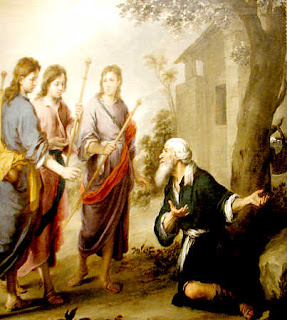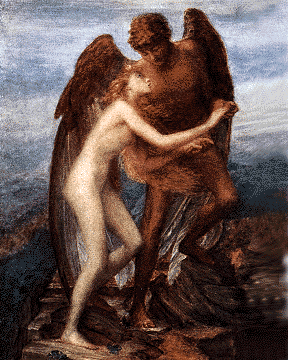
This week I purchased a copy of
The Genesis Debate: Persistent Question about Creation and the Flood for the sole purpose of reading debate section nine between F.B. Huey, Jr. and John H. Walton on
"Are the 'Sons of God' in Genesis 6 Angels?" but in having it will be much interested in many of the other topics discussed.
I immediately jump into reading the John H. Walton section who took the negative position on the discussion, hoping to find some additional theological objections to the angels view of Genesis 6. Unfortunately, this book has proved to be of little to no use in my quest on this topic. However, I will share what Walton does discuss.
He starts by laying out the three basic views that are associated with this discussion (see my previous post for a breakdown of them again), and he states his adherence to the position that the "sons of God" were rulers or princes, and the daughters of men simply the commoners. I breezed over this view in part 7 because it was basically thrown out by the book I was quoting from, as the least substantiated position.
He says he is setting out to "indicate the weaknesses in that (angels) position" and will then "proceed to a defense of position three," (the rulers/prince position). He begins by setting out to establish the principal defenses of the angel view, first quoting from U. Cassuto's "The Episode of the Sons of God and the Daughters of Man" from his book Biblical and Oriental Studies:
Firstly it is impossible that the words benoth ha'adam [daughters of man] in verse 2 should be used in a different sense from that which they have in verse 1 (ha'adam...ubenoth)[man began to multiply and daughters were born...]; and since in verse 1 the human species as a whole is certainly referred to, it cannot be doubted that in verse 2 it is human beings in general that are intended. Since, moreover, the expression bene ha'elohim [sons of God] is employed in antithesis to benoth ha'adam [daughters of man], it is clear that the former pertains to beings outside the human sphere. Secondly, wherever bene (ha)'elohim or bene'elim [literally 'sons of Gods'] occurs (Psalm 29:1; 89:7 [Eng. 6]; Job 1:6; 2:1; 38:7; also Deuteronomy 32:8 according to the text of the Septuagint) angels are referred to. When, therefore, we find in our section the expression bene ha'elohim without any explanatory addition, we have no right to attribute to it a connotation other than that which it normally has in the Bible.
Maybe you are not as dense as me, but I had to re-read that quote about three times or so before it really sunk in what was being so eloquently said. In summary, he is saying the two terms are set against each other to represent two different "types" of beings, not just two different "classes" of humans. He then says that in all of the other places the terms are used it is clearly in reference to angels, and therefore we have no exegetical reason to interpret the term differently in this one verse simply because no clear cut mention of angels is present. To my knowledge, this is one of the foundational and basic exegetical/interpretation principals of interpretation...let the Bible interpret itself. If the Bible defines a term in one place and then uses it in multiple other places, we can easily assume it has the same meaning. Well, surprisingly, Walton takes such an application of interpretation with a grain of salt:
The treatment of the phrase "sons of God" in the history of interpretation provides us with a good example of the potential that exists for the misuse of lexical data. (Now, catch this - JM) It is true that the phrase "sons of God" refers to angels every time that it is used in the Old Testament, but what is the significance of that piece of information? (emphasis mine - JM)
So, he admits that every other place in scripture it
does means angels, but that such a fact has no bearing on its use here in Genesis 6. Wow, I find such a statement to be shockingly ridiculous both logically and biblically. His defense of such a statement is simply because "that phrase only occurs three times in the form that occurs in Genesis 6" and that "This makes for a very small lexical base and cannot be considered sufficient to make broad sweeping statements about exclusiveness in the semantic range of the phrase." So, because it is used consistently to means angels in the other three times it is used, that has no bearing on the fourth use of it, simply because it is only three other times being defined. Three or three hundred times, how can that make a difference? If it is clearly defined the all other cases, why would we even
try to assume it to be different in the fourth case, especially when there is nothing in the text of Genesis 6 to imply it should be interpreted differently?
As we have previously pointed out, the evidence from other Jewish writings, from the understanding of it in history, from the quotes referencing it in the NT, this angel view is the prominent interpretation, and I personally still see no reason why so much trouble is being made to dismiss it. A question that is likewise brought up in the defense of the angel position by Walton's opponent in this book, F.B. Huey, Jr. In his section he quotes from another writer who makes this comment about interpretations of this section by liberal and conservative scholars:
Liberal scholars who usually are associated with denial of the supernatural generally accept Genesis 6:1-4 as an account of a liaison between divine beings and humans, whereas conservative scholars, who believe implicitly in angels, are the ones who tend to disallow any such import to this passage.
I find this to be the case in most conservative churches that I attend. They openly believe in angels, yet as we have seen, seek to dismiss this position in Genesis 6. But why? He continues on by quoting another author, W.A. Van Gemeren, who points out this inconsistency with these unsettling questions:
Why does the theology in which creation, miracles, the miraculous birth and resurrection of Jesus have a place, prefer a rational explanation of Genesis 6:1-4?...Normally, the goal of interpretation has been the elucidation of the word of God so the community of faith may know what to believe and what to do. When, however, the object of interpretation becomes the removal of apparent obstacles to which the passage may give rise, reinterpretation is introduced, and one may wonder how this differs from demythologization...Is the difficulty so great that it must be removed as something offensive? Is it possible that theology has taken the place of exegesis? ("The Sons of God in Genesis 6:1-4 (An Example of Evangelical Demythologization?)," Westminster Theological Journal 43 (Spring 1981) 320.
In short he is asking what the big deal is that we have to reinterpret a verse rather than accept the interpretation as the Bible lays it out? Has our theological and belief systems overthrown proper exegesis/interpretation of the text?
Getting back to Walton's opposing position he goes on to say "it must be admitted that from a theoretical point of view it is still possible that the phrase "sons of God" was limited to angels in ancient Hebrew idiom." But of course follows by saying though, that the narrow range of examples cannot give us conclusive evidence. He then goes through a couple other examples where the individual words (mainly
'elohim) are used to refer to humans, implying that since it can be used to speak of human judges, that it weakens the position that it must always be referring to supernatural beings. He admits a bit of the weakness of this part of his argument by stating "This is of course speculative, but the main point is that there is no sound basis for placing strict limitations on the semantic range of the phrase "sons of God".
In his conclusion on this section of the term, he says "Our conclusion is that there is no element of the text that requires that the sons of God be understood as angels, although we would admit that understanding as one of the possible readings of the text if no other suitable
or preferable explanation can be found (emphasis mine - JM). Since when do we interpret the texts based on our "preferable" views? Is that why there is such a fuss...because the angel view is not
preferred by some? I still ask WHY?
This is a similar argument that we find in the discussion of eschatology, when one side says that the word "generation" is always used referring to the current, living generation of people hearing the message, except when it comes to Jesus' words in Matthew 24 for example, where it obviously
has to mean something totally different than a reference to his generation being spoken to...but hey, that is a topic for another day ;-]
I must say the second part of his discussion, attacking the historical understanding of the term, gives even less insight or help on the matter. Built upon his idea that
'elohim can refer to human judges/kings, he starts a comparison of the attributes revealed in the "well-known Gilgamesh epic" to show that this ancient poem about the fictitious king displays attributes similar those of the Nephilim mentioned in Gen. 6. This basically implies that such terminology was common in pagan literature, and could easily have been likewise used in biblical literature. His concluding points on this are:
I have attempted to demonstrate that each element of Genesis 6:1-4, however vague it may be, has a parallel of sorts in the Gilgamesh epic, as follows: (1) Gilgamesh qualifies as a "son of God" by virtue of titulary; (2) as a hero of old he personifies the biblical category of gibborim [hero], and as a giant he qualifies as one of the nephilim (if such an understanding of nephilim is considered accurate); (3) through the exercise of jus primae noctis [law of the first night] Gilgamesh takes wives (whichever ones he wants), and even in the Gilgamesh epic this is used to characterize his unjust behavior; (4) Gilgamesh is frustrated in his attempts to gain immortality.
He admits that the parallel in itself is not the point, but that this story shows the ancient royal motifs that may have been influential in the Genesis writer's use of terms.
This interpretation makes sense of the elements of Genesis 6:1-4 in the context of its ancient Near Eastern background. The fact that it fits does not of course prove that it is right. In the case of this difficult passage, however, anything that even fits is worthy of consideration.
A couple questions on his last statement there: (1) Why is this passage so difficult in light of the other clear uses in Scripture? in History? in other Jewish writings? (2) Why go to such extremes to rationale another view as "worthy of consideration" to begin with...I still wonder that.
View the other parts of the topic
Part 1 |
Part 2 |
Part 3 |
Part 4 |
Part 5 |
Part 6 |
Part 7 |
Part 8












